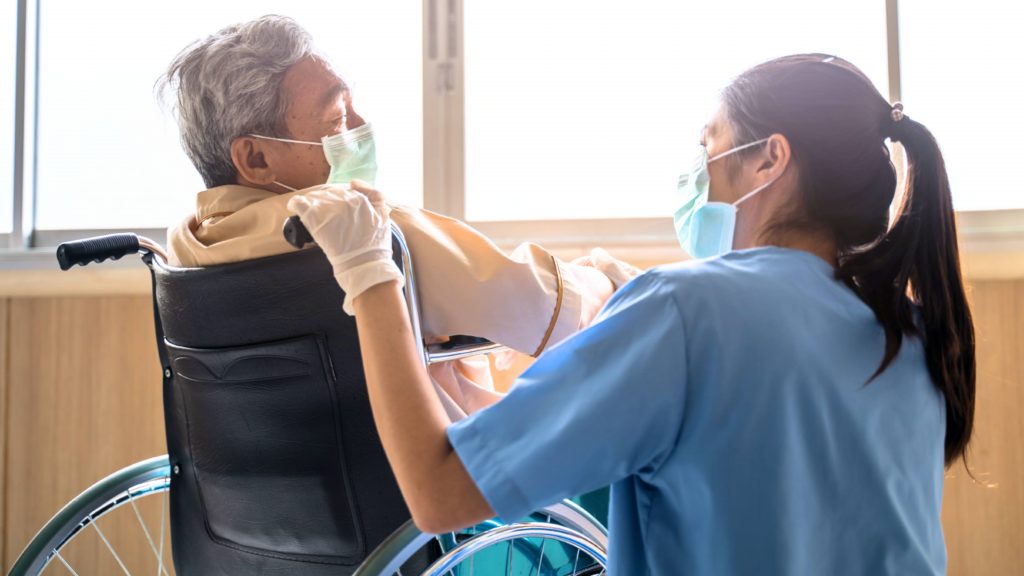
The ongoing COVID-19 pandemic affects everyone, particularly older adults who are more susceptible to disease, negative effect of health decline and loss of connectivity, according to Dr. Christina Chen, a Mayo Clinic geriatrician.
Older adults are at higher risk of requiring hospitalization or dying if they are diagnosed with COVID-19. Along with the threat of severe illness or death from COVID-19, managing chronic disease and dementia care adds to challenges that caretakers face while caring for older adults.
During the pandemic, routines have been interrupted and connections with loved ones have been impacted. "And this has led to a very negative and devastating impact on our older adults," says Dr. Chen.
Watch: Dr. Christina Chen talks about older adults and COVID-19.
Journalists: Broadcast-quality soundbites are available in the downloads at the end of the post. Please "Courtesy: Christina Chen, M.D./Geriatric Medicine/Mayo Clinic."
"The body really needs four essential things. It needs good nutrition (nourishing food and hydration). We need good quality sleep. We need to stay connected," says Dr. Chen. "And, finally, we all need to move by staying active, mobilizing and staying independent. This all contributes to a healthy body, healthy mind, healthy spirit. If any of these pillars are interrupted or poorly optimized, it can impact the other spheres of influence, and everything eventually will crumble."
If you and your loved one are tech-savvy, social media and video communication platforms may help increase the feeling of connection and reduce the feeling of loneliness and isolation.
Ways to help older adults stay connected during this time of isolation include:
- Social media
- Telephone calls
- Letters or cards, care packages
Dr. Chen says some older adults may respond better to nontechnical ways of communication. Rather than through social media or platforms, consider a commitment to make a phone call each day, send letters, video call if they are savvy enough to work with virtual technologies, or send care packages. The key is to stay consistent.
"When you have conversations with loved ones, bring up topics that instill joy and hope. Talk about good memories from the past, or even help them discover some new hobbies. Instill new ideas — anything to help them get through their days. Give them reasons and opportunities to find things to look forward to. We all need to have something to look forward to," says Dr. Chen.
Movement
Physical function and exercise are critical. "Physical activity is the only way that will help preserve your function and, ultimately, your independence. Equate independence to happiness in older adults," she says.
"If you can work on lower extremity strength and balance and try to get in that 20- to 30-minute mobility or stretching exercise. Or do something a little more than what you are currently doing, something sustainable," says Dr. Chen. "Find a new creative routine. Every morning before your breakfast or after your meals, dedicate 20 to 30 minutes to your physical health. Do nothing else. Find a room in the corner somewhere we can do this. Grab your spouse, grab your partner to keep you accountable."
Rest and mental health breaks
Along with taking time for physical health, Dr. Chen says it's important to dedicate time to mental health as well. She says it's important to never neglect emotional health that seems to be getting worse because it can be a spiral.
"If there is clinical depression, no amount of positive talk will get someone out of severe clinical depression, so that might need to be treated," says Dr. Chen. "Don't ignore that and get the medical help that is needed when necessary."
For the safety of its patients, staff and visitors, Mayo Clinic has strict masking policies in place. Anyone shown without a mask was recorded prior to COVID-19 or in an area not designated for patient care, where social distancing and other safety protocols were followed.
Information in this post was accurate at the time of its posting. Due to the fluid nature of the COVID-19 pandemic, scientific understanding, along with guidelines and recommendations, may have changed since the original publication date.
For more information and all your COVID-19 coverage, go to the Mayo Clinic News Network and mayoclinic.org.







